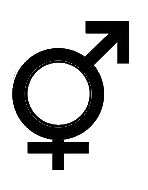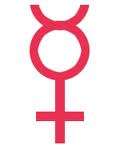Costas
¥
χαν, χουν, και τώρα χεν:
Sweden Adopts a Gender-Neutral Pronoun (care2)
Swedes are shaking up their language with a new gender-neutral pronoun. The pronoun, “hen,” allows speakers and writers to refer to a person without including reference to a person’s gender. This month, the pronoun made a big leap toward mainstream usage when it was added to the country’s National Encyclopedia.
Ωστόσο το έδαφος ήταν προετοιμασμένο από την ίδια τη γραμματική της γλώσσας:
(Wikipedia)
Nouns have two grammatical genders: common (utrum) and neuter (neutrum), which determine their definite forms as well as the form of any adjectives used to describe them. Noun gender is largely arbitrary and must be memorized; however, around three quarters of all Swedish nouns are common gender. Living beings are often common nouns, like in en katt, en häst, en fluga, etc.
Swedish once had three genders—masculine, feminine and neuter. Though traces of the three-gender system still exist in archaic expressions and certain dialects, masculine and feminine nouns have today merged into the common gender. A remnant of the masculine gender can still be expressed in the singular definite form of adjectives according to natural gender (male humans), in the same way as personal pronouns, han/hon, are chosen for representing nouns in Contemporary Swedish (male/female humans and optionally animals).
Personal pronouns
Singular
Person.....Nominative......Objective..Possessive: com./neut./pl.
3 Masc.....han...............honom.....hans
3 Fem......hon...............henne.....hennes
3 Com.....den................den........dess
3 Neu......det................det........dess
3 Indef....man...............en.........ens
Sweden Adopts a Gender-Neutral Pronoun (care2)
Swedes are shaking up their language with a new gender-neutral pronoun. The pronoun, “hen,” allows speakers and writers to refer to a person without including reference to a person’s gender. This month, the pronoun made a big leap toward mainstream usage when it was added to the country’s National Encyclopedia.
Ωστόσο το έδαφος ήταν προετοιμασμένο από την ίδια τη γραμματική της γλώσσας:
(Wikipedia)
Nouns have two grammatical genders: common (utrum) and neuter (neutrum), which determine their definite forms as well as the form of any adjectives used to describe them. Noun gender is largely arbitrary and must be memorized; however, around three quarters of all Swedish nouns are common gender. Living beings are often common nouns, like in en katt, en häst, en fluga, etc.
Swedish once had three genders—masculine, feminine and neuter. Though traces of the three-gender system still exist in archaic expressions and certain dialects, masculine and feminine nouns have today merged into the common gender. A remnant of the masculine gender can still be expressed in the singular definite form of adjectives according to natural gender (male humans), in the same way as personal pronouns, han/hon, are chosen for representing nouns in Contemporary Swedish (male/female humans and optionally animals).
Personal pronouns
Singular
Person.....Nominative......Objective..Possessive: com./neut./pl.
3 Masc.....han...............honom.....hans
3 Fem......hon...............henne.....hennes
3 Com.....den................den........dess
3 Neu......det................det........dess
3 Indef....man...............en.........ens



